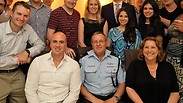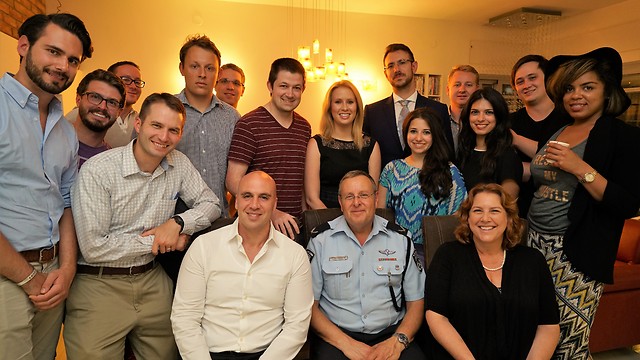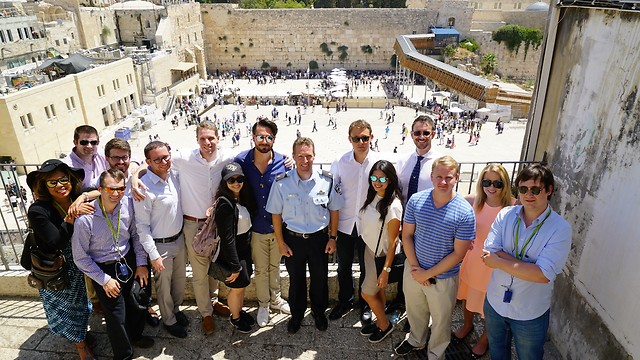
Our Soldiers Speak
When senior IDF officials or serving members of the Israeli National Police arrive in the US to conduct lectures and seminars on elite unversity campuses and in Congress the organization largely responsible for the initiatives is Our Soldiers Speak.

The organization, founded in 2006, specializes in bringing IDF soldiers, officers and generals from the field to the campuses and communities in the English-speaking world.
“We have already reached more than 370 campuses,” said founder and director of the organization Benjamin Anthony, who served in the IDF and fought in Lebanon in 2006.

Founder of OSS Benjamin Anthony (center left) with interantional law and graduate students during tour in Israel (Photo: Dvir Media)
“We are the only organization in Israel’s history which has succeeded in bringing active, serving, uniformed members of the Israeli national police and of the IDF to these places. We send senior officers of the highest rank from the police and the IDF to hold academic seminars and discussions on campus and in Congress,” Anthony told Ynet.
During the tour, the organization incorporated into its program its long-held belief that Israel’s best light is presented by Israel itself.
To that end, over the last few days Our Soldiers Speak invited a number of law students and select grauate students from the most reputable universities in the US, England, France and Germany to participate in an 11-day tour of Israel through the dual lens of law and policy with a particular emphasis on matters that most frequently appear in the international media. During the tour, students were given exclusive access to the senior-most voices in Israel in the realm of law, policy, politics, diplomacy, security, the judiciary and media; with opportunity to engage in a dialogue at the sites being discussed.
“The State of Israel is its own greatest ambassador. We wanted to transcend the limitations of providing lectures abroad by allowing them to actually see and hear for themselves. We wanted them to see what Israel faces, we wanted them to see the borders so that they could understand the challenges,” Anthony explained.
What are the most difficult questions that the students asked?
“We hear many questions which touch on proportionality in times of conflict and how investigations are conducted in Israel following a war’s conclusion. It was also asked how Israel abides by international law during incidents which transpire so close to civilian populations.”
Anthony shared his reasons for specifically bringing students hailing from the internationally-leading law schools.
“The vast majority of congressmen, senators, community leaders and presidents come from the field of law. Therefore, it is clear to us that many of the law and policy students of today will be the elected officials of tomorrow. We wish to equip these future leaders with deep knowledge and understanding about the area.”
Were the students surprised by what they were shown or by the answers they received?
“They are surprised but they didn't reject the the answers and they don’t doubt their credibility because they receive them from extremely high-ranking and well-qualified officials. The students themselves are of a high enough standard that they are open to explanations. We see the difference that this makes. The Israeli officials who speak to them always convey extremely detailed explanations.”
How are the locations and meetings selected?
“We combined historic areas and those made familiar to people because of media coverage. We went to all the places related with law, security and diplomacy and at each one of them we heard comprehensive lectures.”
“The tour began a few days ago in Herzliya and from there we continued to the border with Lebanon where they received a lecture about wars and its various dynamics. We then went on to the borders with Syria and then to Jerusalem, the Gaza border and the Jordanian border. They also visited members of the Knesset. In between we gave them the chance to see and enjoy Tel Aviv, Jerusalem, the Dead Sea and then we continued.”
What were the students’ reactions?
“They were extremely excited, especially by the conversations with the spokespeople. They were very impressed by the openness and desire to be more active. They feel that they better understand the situation. You can see that they see just how imminent the threats are, something which is difficult to comprehend from a distance. They understand how much Israel wants and strives for peace. The understanding brought about by proximity was extremely significant.”
Leo, a German student from the US shared his experience during the trip:
“I studied international law in Georgia and Washington and I have seen the lectures organized by Our Soldiers Speak. From a legal point of view I felt that there were a lot of confusing facts presented to us in the international media. There were countries around Israel with strong voices in the media which took a stance and gave the impression that they were familiar with what happens in Israel,” said Leo.
“During this tour we visited every border in Israel and learned, up close, what takes place. From the media it is difficult for me to understand these things. We were on the border with Gaza where they showed us the rockets and we travelled just one hour to Tel Aviv. Just one hour from where rockets were fired. We suddenly understood the dangers Israel faces. We understood that this was a small country defending itself.”
"What I found fascinating during the trip was that we genuinely received facts. There was no tendency to lead us into thinking in any specific way. I understood the necessity of the things that Israel does. It is very easy to sit in the US during a far-away conflict and comment on things.”
“I support acquiescence with international law but I understand things on a deeper level. I knew about criticism against fences and checkpoints and then we visited Jerusalem where they showed us just how easy it was to blow yourself up in Israel in the space of ten minutes. From afar we don’t understand the close proximity of it all.”
“The trip was also fun in general. We got to know Jerusalem, we saw the beauty of many places. It was such a full experience.”
Adam Fine from Duke University also shared his reflections of the trip:
“I really enjoyed being in Israel. Despite my name, I am not Jewish, and I grew up in a Christian school and the experience was extremely meaningful. We managed to see many sides of Israel. During the first day we saw historical sites, we spoke about Hezbollah in Lebanon, and in the Golan we spoke about the situation in Syria and then went on to Jerusalem. In the Old City we received a briefing from a senior police officer who explained how things really look and explained about the sensitivity of every element. I learned about the conflict in college but this was the first time that I understood the significance of the reality on the ground,” he said.
“When we report about how many casualties there are on both sides, we see extremely harsh images which make it hard to draw conclusions about what is actually happening. I understood how complicated the dynamics are.”
"I was always sensitive to this subject but I am from Arizona. I wasn't aware of how close everything is. I suddenly understood that it's just an hour from the border to Tel Aviv. This gives you a greater understanding of things. The thing that surprised me the most was Israeli people’s ability to cope.”
Fine concluded by saying he was particularly impressed with Israel’s “ability to implement international law despite the difficulties. Even when the enemy exploits the law for its own benefits Israel does not break the law.”

















